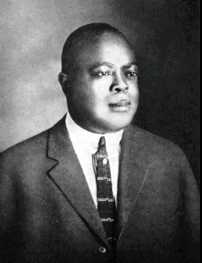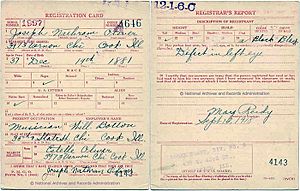King Oliver facts for kids
Quick facts for kids
King Oliver
|
|
|---|---|

Joseph Oliver, ca. 1915.
|
|
| Background information | |
| Birth name | Joseph Nathan Oliver |
| Also known as | King Oliver |
| Born | December 19, 1881 Aben, Louisiana, U.S. |
| Died | April 10, 1938 (aged 56) Savannah, Georgia, U.S. |
| Genres | |
| Occupation(s) | Bandleader |
| Instruments | Cornet |
| Years active | 1907−1937 |
| Associated acts | |
Joseph Nathan "King" Oliver (born December 19, 1881 – died April 10, 1938) was an American jazz cornet player and bandleader. He was famous for his unique playing style. He was also one of the first to use mutes in jazz music.
King Oliver wrote many jazz songs that are still played today. Some of his well-known tunes include "Dippermouth Blues" and "Doctor Jazz". He was also a very important mentor and teacher to the legendary jazz musician Louis Armstrong. Armstrong even said that without Joe Oliver, jazz music would not be what it is today.
Contents
King Oliver's Early Life and Music Journey
Joseph Nathan Oliver was born in Aben, Louisiana, near Donaldsonville. He moved to New Orleans when he was young. He first learned to play the trombone, but then switched to the cornet.
From 1908 to 1917, he played the cornet in New Orleans brass bands and dance bands. He co-led a band with trombonist Kid Ory. Many people thought this band was one of the best in New Orleans during the late 1910s. King Oliver was very popular and in high demand for all kinds of music jobs.
In 1918, Oliver moved to Chicago with his family. He found work with other musicians from New Orleans. He became the leader of a band, playing in many Chicago clubs. In 1921, he took his band to the West Coast, performing in San Francisco and Oakland, California.
King Oliver and His Creole Jazz Band
Oliver and his band returned to Chicago in 1922. They started playing at the Royal Gardens cabaret as King Oliver and his Creole Jazz Band. This band later became known as the Lincoln Gardens.
The band included Oliver on cornet and his young student, Louis Armstrong, also on cornet. Other members were Baby Dodds on drums, Johnny Dodds on clarinet, Lil Hardin on piano, Honoré Dutrey on trombone, and Bill Johnson on double bass. Lil Hardin later became Louis Armstrong's wife.
In 1923, this group made recordings that showed off the "New Orleans style" of jazz. This style is also called Dixieland, where musicians improvise together. These recordings helped bring this exciting music to a bigger audience. Many white musicians would visit Lincoln Gardens to learn from Oliver and his band.
Later Years and Musical Innovations
In the mid-1920s, Oliver made his band bigger, calling it King Oliver and his Dixie Syncopators. They started using more written music with jazz solos. This band played at the Plantation Café, competing with Louis Armstrong's band, the Sunset Stompers.
In 1927, Oliver's band went to New York. However, he soon broke up the band to take on different jobs. In the late 1920s, he faced challenges playing his trumpet because of gum disease. He started having other musicians play the solos, including his nephew Dave Nelson.
Oliver was very creative with his music. He loved changing the sound of his cornet. He was a pioneer in using mutes, like a rubber plumber's plunger, a derby hat, bottles, and cups. His favorite mute was a small metal one. He used it for his famous solo on his song "Dippermouth Blues." His recording "Wa Wa Wa" even gave the name "wah-wah" to this type of sound.
Oliver was also a talented composer. He wrote many songs that are still played today, such as "Sweet Like This" and "Canal Street Blues." His song "Dippermouth Blues" was even adapted by another bandleader, Fletcher Henderson, and renamed "Sugar Foot Stomp."
King Oliver's Influence on Louis Armstrong
King Oliver was a very important mentor to Louis Armstrong in New Orleans. He taught young Louis and even gave him his job in Kid Ory's band when Oliver moved to Chicago. A few years later, Oliver asked Armstrong to join his band in Chicago.
Louis Armstrong looked up to Oliver and called him "Papa Joe." He considered Oliver his idol and inspiration. In his autobiography, Armstrong wrote that it was his dream to play like Oliver. He truly believed that without Joe Oliver, jazz music would not be what it is today.
Challenges and Final Years
King Oliver sometimes struggled with managing his business. Some of his managers stole money from him. He also missed out on important jobs because he asked for too much money. For example, he lost the chance to play at New York City's famous Cotton Club. Instead, Duke Ellington got the job and became very famous.
The Great Depression brought hard times for Oliver. He lost all his savings when a bank failed. He struggled to keep his band together, playing small jobs until the group finally broke up.
Oliver also had health problems, including a gum disease called pyorrhea. This made it very hard for him to play his trumpet. By 1935, he could no longer play at all. Oliver ended up in Savannah, Georgia, where he had to pawn his trumpet and suits. He briefly ran a fruit stall and then worked as a janitor.
King Oliver died in Savannah, Georgia, on April 10, 1938. He was very poor and could not afford medical treatment for his illness. His sister used her rent money to bring his body to New York. He was buried at Woodlawn Cemetery in The Bronx. Louis Armstrong and other loyal musician friends attended his funeral.
Honors and Awards
In 2007, King Oliver was honored as a founding member of the Gennett Records Walk of Fame in Richmond, Indiana.
See also
 In Spanish: Joe King Oliver para niños
In Spanish: Joe King Oliver para niños
 | Kyle Baker |
 | Joseph Yoakum |
 | Laura Wheeler Waring |
 | Henry Ossawa Tanner |


